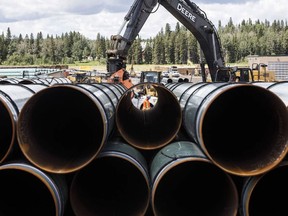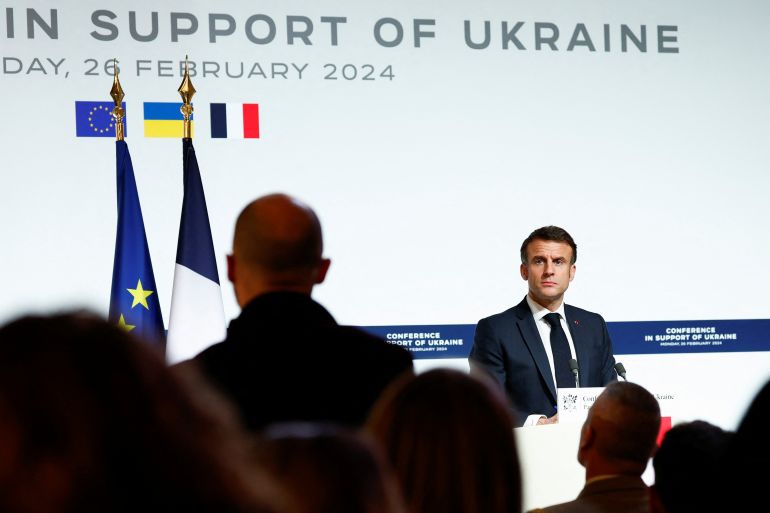OIL NEWS
Trudeau's pipeline project increases cost estimate by $3.1 billion
, Bloomberg News
The expansion of the Trans Mountain oil pipeline will cost about $3.1 billion more than the Canadian government-owned company running the project projected in May, another financial setback for a project beset by spiralling expenses and years of delays.
Costs for the expansion — which involves twinning a pipeline stretching from Edmonton to Vancouver — will be 10 per cent more than the most recent estimate of $30.9 billion, the company said in a filing with the Canada Energy Regulator on Monday.
That brings the total cost to about $34 billion, more than six times the original estimate of $5.4 billion in 2013.
The latest cost increase — this time due to construction challenges that are delaying the new line’s startup into the second quarter — marks another setback for a project that Prime Minister Justin Trudeau has expended significant political capital on.
Trudeau’s government bought the line to save the expansion project from cancellation and give Canada’s oil producers a way to sell their crude to markets in Asia, boosting prices and lessening their dependence on the U.S.
The pandemic, years of labour shortages and technical challenges have caused the project’s costs to soar and required increasing government funds.
The government’s ownership of the pipeline has also dented the Liberal prime minister’s standing among environmentalists while winning him little support in the conservative oil-producing province of Alberta.
Trans Mountain pipeline seen driving
Canadian oil to three-year high
Robert Tuttle, Bloomberg News
Canada’s relatively cheap heavy crude is set to spike temporarily in the coming months as a massive new export pipeline starts operations just as oil-sands companies curtail production.
Western Canadian Select’s discount to U.S. benchmark West Texas Intermediate may shrink from its current level of about US$17.10 per barrel to less than $10 a barrel between May and July, according to Jeremy Irwin, senior oil markets analyst at Energy Aspects. The last time the discount was in single digits was in April 2021.
The pricier crude would raise costs for refiners in the U.S. Midwest who rely heavily on Canadian oil and have long benefited from the discounts it has sold at, partly because of a lack of pipelines. Those swelling costs may be partly passed onto U.S. Midwestern drivers as higher gasoline prices.
Driving the potential gain for Canadian crude is the expansion of the Trans Mountain pipeline, which will add the capacity to ship an additional 590,000 barrels of oil a day from Alberta to a Pacific Coast port and reduce producers’ reliance on American refiners. At the same time as the pipeline is due to start up in the second quarter, major oil-sands companies including Imperial Oil Ltd., Canadian Natural Resources Ltd. and Suncor Energy Inc. are planning to reduce output as they perform maintenance work on their facilities
Longer term, the discount on Canadian crude may return to normal levels or even widen. S&P Global estimates that Alberta oil producers are poised to add 500,000 barrels a day of supply by the end of next year, which will take up almost all of the new capacity on Trans Mountain. Filling up the line leaves the province’s drillers at risk of the pipeline shortages that have bedeviled them for years
Energy Aspects had warned of the potential overlap of oil-sands maintenance and Trans Mountain’s startup in a November report. Over the long term after the Trans Mountain startup, Canadian crude’s discount may average about $12 a barrel, Irwin said.
Canada sent 3.14 million barrels of oil to the U.S. Midwest in November, accounting for almost half of the U.S.’s crude imports, according to the Energy Information Administration
Feb. 26, 2024.
The Trans Mountain pipeline expansion: Who wins, who loses and how did we get here?
More than a decade in the making, the $30-billion project could be a game-changer for Canadian oil
Author of the article: Naimul Karim
Published Feb 26, 2024
 Pipes for the Trans Mountain pipeline expansion are unloaded in Edson, Alta last year. PHOTO BY JASON FRANSON /The Canadian Press
Pipes for the Trans Mountain pipeline expansion are unloaded in Edson, Alta last year. PHOTO BY JASON FRANSON /The Canadian PressArticle content
The Trans Mountain pipeline expansion project may still be months away from completion, but industry insiders have already started speculating on how it will impact the oil sector, from a potential increase in the price of Canadian oil to the opening of new export markets.
The expansion project will twin the existing 1,150-kilometre Trans Mountain pipeline between Alberta and British Columbia and enhance the system’s export facilities. The original pipeline was built in 1953 and has the capacity to transfer about 300,000 barrels per day. The new pipeline will be able to deliver an additional 590,000 barrels per day
But as we near the end of construction on the government-owned project that has been more than a decade in the making, plenty of questions remain about what lies ahead.
How we got here
Houston-based Kinder Morgan Inc. first proposed expanding the Trans Mountain pipeline in 2012. Its goal was to begin construction in 2017 and start a new flow of oil in 2019.
But the move was opposed by environmentalists who pointed out the existing pipeline had a history of spills. There have been 84 spills reported since 1961. While 70 per cent of them occurred at pump stations or terminals, 30 per cent occurred along the pipeline, with 20 incidents linked to the release of crude oil from the pipeline.
Kinder Morgan in 2017 threatened to cancel the project due to opposition from the British Columbia’s NDP government. Shortly after, the company sold the pipeline and the expansion project to the Government of Canada for $4.5 billion. The cost of the project has since increased to about $30.9 billion.
It's ridiculous to have this pipeline costing $31 billion — that is obsceneTRISTAN GOODMAN, CHIEF EXECUTIVE OF THE EXPLORERS AND PRODUCERS ASSOCIATION OF CANADA
Trans Mountain Corp., the government-owned company that’s expanding the pipeline, attributed the rise in price to several reasons, including inflationary pressures, the catastrophic floods in British Columbia, agreements with Indigenous communities, route changes to avoid environmentally sensitive areas, wildfires and labour shortages
The company also had to spend additional money on cultural protection as it discovered 83,000 artifacts, which have been returned to First Nations groups, during the construction process.
Tristan Goodman, chief executive of the Explorers and Producers Association of Canada, a national lobby group representing oil and gas entrepreneurs, said the rising cost of the pipeline is due to the government’s “failed” regulatory framework for environment, energy and natural resources projects. He said the entire system needs to be looked at.
“The government’s intentions are right to have good oversight, but they haven’t figured out how to get that oversight to be efficient and cost effective,” he said. “It is ridiculous to have this pipeline costing $31 billion — that is obscene.
The expansion project is now more than 98 per cent complete and is expected to begin operating in the second quarter.
Benefits of another pipeline
The main goal of the pipeline is to ensure Canadian oil producers get better prices for their product. The price of crude oil depends upon its quality, transportation costs and market forces. Heavy crudes are sold at a lower price because they are harder to refine and yield a lower amount of gasoline and diesel. Canada mostly produces heavy crude oil from Alberta and Saskatchewan.
The price also depends upon the distance between the producer and consumers. The greater the distance, the less producers receive for their products. It’s also cheaper to deliver oil through pipelines than trains.
It would cost about US$9 to US$10 to transport oil from Alberta to the U.S. Gulf Coast through pipelines, according to BMO Capital Markets analyst Randy Ollenberger, and about US$17 by rail. He expects the price differential between Canadian and U.S. oil to more or less reflect the transportation cost between the two markets and drop to around US$10 to US$12 per barrel from US$19 after the pipeline starts.
The new pipeline is also expected to allow Canadian producers to deliver oil to new markets, including the U.S. West Coast and Asia since the system will have better export facilities, such as ports.
For example, Ollenberger said that if a Canadian producer wanted to export oil to California, it would have to move the barrels by rail since there are no connecting pipelines. California imports heavy oil from other countries further away through tankers. Because of the new facilities being built to accommodate the Trans Mountain pipeline, Canada will be able to export barrels from the west coast using tankers, which will lower the transportation cost.
It’s a similar situation with China. Canada exports about 150,000 barrels a day to China, he said, but they depart from the U.S. Gulf Coast via tankers.
“When the pipeline comes into service, we can send it directly from the west coast,” Ollenberger said.
The additional pipeline is also expected to give Canadian oil producers more options for refiners at the other end of the pipeline.
“If refiners know you are trapped into one pipeline, they can discount because they have other options to go to at the bottom of that line,” Goodman said. “Whereas if the producer is given another access point, they can pick up the product and say, ‘I am not going to put it through this line, I am going to put it in this new line.’ That forces competition.”
Likely winners and losers?
Enough producers have already committed to use the new pipeline to take up about 80 per cent of the planned capacity. These companies include Cenovus Energy Inc., Imperial Oil Ltd. and Canadian Natural Resources Ltd., according to Trans Mountain. The remaining capacity can be used on a spot basis.
Imperial Oil is a minor player in terms of the pipeline reservations it has made, chief executive Brad Corson said on a conference call in February. But, overall, he said the pipeline will have a positive impact on the industry and reduce the discount in the oil prices Canadian producers receive.
He said Imperial Oil will continue to ship crude to its usual destinations, but the new pipeline could provide it with options to ship west or south.
Cenovus has a larger capacity on the pipeline. The company on a conference call last year said the pipeline would be a “great tool” to enter new markets globally, but it expects the start-up process to be a “little bumpy” out of the gate.
There have also been talks about how the Trans Mountain pipeline might negatively affect Enbridge Inc. since it runs its own pipeline — the biggest in Canada — to transport petroleum products. However, the company in February rejected those claims, saying that oil production has been on the rise and will continue to increase.
“This notion that the Mainline is going to lose a bunch of volume when TMX (Trans Mountain pipeline expansion) comes in is a bit of a stale concept,” Colin Gruending, the company’s head of liquids pipelines, said. “It might have been valid a few years ago, but it’s been delayed materially. And in that multiyear period of delay, supply has structurally and permanently grown.”
Ollenberger said companies don’t necessarily have to be a contractual partner of the Trans Mountain pipeline to benefit from its expansion since they may be able to sell their oil at a higher price to other markets through other pipelines, such as the one run by Enbridge.
“The benefit really is for the industry overall,” he said. “It allows the industry to receive a better price for its product and to grow.”
In anticipation of those better prices, the industry has already started to pump more oil. So much so that Goodman expects the new pipeline to be saturated within a year or two instead of five or six years as initially assumed.
• Email: nkarim@postmedia.com
Canadian oil and gas producers bump up spending, industry group says

Canadian oil and natural gas producers will spend an estimated C$40.6 billion ($30.07 billion) on capital projects this year, up slightly from C$39 billion last year, the Canadian Association of Petroleum Producers (CAPP) said on Tuesday.
Producers are staying disciplined with spending even as Canadian oil production is at record-high levels ahead of the expected completion of the Trans Mountain oil pipeline expansion in the second quarter, CAPP CEO Lisa Baiton said.
WHY IT’S IMPORTANT
Canada, the fourth-largest global oil producer, has steadily raised production to take advantage of expanding pipeline capacity even as OPEC and the wider OPEC+ alliance have implemented a series of output cuts since late 2022 to support prices.
Canada’s congested oil pipelines and lack of export capacity for liquefied natural gas (LNG) have long limited expansion of crude and gas production. The Canadian government-owned Trans Mountain expansion has been dogged by cost over-runs and construction problems , but will nearly triple the flow of oil on that pipeline from Alberta to the Pacific coast, where it can be shipped to refineries on the U.S. West Coast and in Asia.
Shell-led LNG Canada is finishing work on the country’s first major LNG export facility, which will boost demand for Canada’s gas when it starts operation, possibly within the next year.
KEY QUOTE
“Despite these positive trends there remains a sense of caution largely due to the ongoing uncertainty surrounding proposed emissions policy in Canada,” Baiton said.
BY THE NUMBERS
CAPP estimates conventional oil and gas capital spending at C$27.3 billion in 2024, with oil sands spending pegged at C$13.3 billion.
Spending in Alberta, Canada’s main oil producing province, looks to remain steady at C$29 billion, with small increases expected in Saskatchewan, British Columbia and Newfoundland and Labrador, CAPP said.
Source: Reuters (Reporting by Rod Nickel in Vancouver, British Columbia; Editing by Chizu Nomiyama)
CAPP projects slight increase in Canadian oil and gas capital spending in 2024
The industry group representing Canada's oil and gas producers says capital investment in the sector will edge slightly higher in 2024.
The Canadian Association of Petroleum Producers is forecasting capital expenditures for the upstream oil and natural gas sector will reach $40.6 billion this year, a small increase from the $39 billion invested by companies in 2023.
CAPP president and CEO Lisa Baiton says the sector is optimistic in anticipation of the expected completion of the Trans Mountain pipeline expansion, which has led Canadian oil producers to boost their output to record levels.
But she says companies are also feeling cautious in light of what she describes as ongoing uncertainty surrounding emissions policy in Canada.
In Alberta specifically, CAPP is forecasting oil and gas producers to maintain a steady investment level year over year at $29 billion, with the oilsands expected to contribute around $13.3 billion of that.
While a consortium of oilsands companies known as the Pathways Alliance have proposed spending $16.5 billion on a massive carbon capture and storage network to reduce emissions from oilsands sites in northern Alberta, they have not yet pulled the trigger with a final investment decision.
This report by The Canadian Press was first published Feb. 27, 2024.
Crude-by-rail shipments jumped in last half of 2023 as Alberta's oil output grows
Canadian crude-by-rail shipments nearly doubled in volume in the last six months of 2023, as oil output from Alberta surged to all-time highs and the Trans Mountain pipeline expansion remained under construction.
Data from the Canada Energy Regulator released Monday shows oil-by-rail export volumes jumped from 78,747 barrels per day in May of last year to a high of 167,006 in November.
Though they then declined six per cent to 157,142 in December, that was still 25 per cent higher than the country's crude-by-rail shipments in December 2022.
For the full year, Canadian crude-by-rail exports averaged 119,077 barrels per day, a seven-year low and down 17 per cent from 2022.
But the sharp uptick in the last half of the year shows the impact of surging oil output in Alberta that has filled Canada's oil export pipelines close to capacity.
Last year, Alberta’s crude oil production hit an all-time record, totalling just under 1.4 billion barrels last year or about 3.73 million barrels per day.
The increase came as oilsands companies have been ramping up to prepare for the opening of the Trans Mountain pipeline expansion, which will add an additional 590,000 barrels per day of export capacity for this country's energy industry.
When the Trans Mountain project does come online and begins to fill with oil, the recent increase in crude-by-rail shipments should reverse, said BMO Capital Markets analyst Ben Pham in a recent report.
"For the first time in over a decade, the (Western Canadian Sedimentary Basin) will have excess crude takeaway capacity," Pham wrote, noting BMO expects Western Canadian crude oil supply to increase from 5 million barrels per day in 2023 to 5.3 million in 2025 and 5.6 million in 2030.
In addition to allowing Canadian producers to grow production, the addition of the Trans Mountain expansion is expected to improve the price they receive for their product. The Western Canada Select differential, a discount Canadian oil companies typically have to absorb in part due to a lack of export capacity, is expected to narrow when the new pipeline starts up.
But Trans Mountain Corp., the company building the pipeline expansion, recently pushed the pipeline's in-service date back from the first quarter to the second quarter of this year due to unexpected construction difficulties in B.C.
Eight Capital analyst Phil Skolnick said in a note to clients Monday that the project must be completed soon or Canadian producers will take a hit to their bottom line.
"Estimated growth in Western Canada will require (Trans Mountain) start-up by Q3/24 in order to prevent differentials blowing out, in our view, as we see exportable volumes exceeding current pipeline export capacity at that time," Skolnick wrote.
He added that even with the addition of the Trans Mountain expansion, Canada's oil output is growing so quickly that exportable supply could exceed pipeline capacity as early as 2026.
"This puts the country's producers in a vicarious situation as the (Trans Mountain) project took over a decade to complete, raising doubt of another major export pipeline ever being constructed," he said.
This report by The Canadian Press was first published Feb. 26, 2024.
Oil industry faces a 'sentiment problem': Nuttall
, BNN Bloomberg
A Canadian portfolio manager says he remains bullish on the global oil industry despite signs of a demand slowdown.
Eric Nuttall, partner and senior portfolio manager at Ninepoint Partners, told BNN Bloomberg that he believes certain organizations such as the International Energy Agency (IEA) are underestimating the demand for oil in 2024.
“(The IEA) is very, very pessimistic on demand,” he said, adding that there was a consensus among those he spoke with during a recent energy-focused trip to Saudi Arabia that the organization has become overly politicized.
“I think there's concern that too many people are listening to an organization that no longer serves its original purpose.”
Nuttall said that OPEC has a better track record of accurately predicting oil demand. The organization forecasts demand of 2.25 million barrels per day in 2024, compared to the IEA’s 1.2 million barrels per day.
Nuttall said that he sees the market being “infatuated” with narratives about slowing demand and faltering OPEC cohesion, but that after his trip to Saudi Arabia he believes those narratives remain false.
“I think we suffer from a sentiment problem, not a fundamental problem,” he said.
Canada’s energy outlook
Nuttall said that his recent trip also reinforced his view that other resource-rich countries like Saudi Arabia are approaching the clean energy transition much more effectively than Canada is.
“They're getting it right and we're getting it wrong. In Canada, we think we're going to solve the climate crisis by taxing farmers who use natural gas to dry their crops,” he said.
“(Saudi Arabia) is promoting oil and natural gas production knowing that the demand will be there for decades ahead and leveraging the resource that offers to then invest in technologies such as carbon capture… it's just a much smarter approach that they're taking.”
NFeb. 26, 2024.uttall said oil’s strong fundamentals have set up Canadian energy stocks for success this year, and added that recent M&A activity in the space is mainly a “function of poor sentiment.”
“Companies must get bigger to gain relevance to the ideas list of the generalist investor that is only going to own two or three names, and so we're seeing that consolidation further,” he said.
Feb. 26, 2024.








 A polling site at the University of Michigan on Tuesday. Many students across the state were on spring break and not on campus.Credit...Brittany Greeson for The New York Times
A polling site at the University of Michigan on Tuesday. Many students across the state were on spring break and not on campus.Credit...Brittany Greeson for The New York Times
